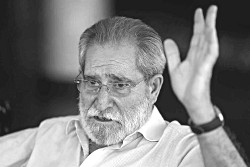




|
Pepetela
(1941-)
 Angolan leftist and novelist. Born in Benguela to a middle-class family of Portuguese descent, he got to know from his childhood people of all races, as his native city at the time was the most multicultural and integrated in Angola. Influenced as a teenager by the leftist ideas of his journalist uncle, he moved to Lubango, a segregated city, to attend secondary school and was disgusted by the racial intolerance and befriended a leftist priest who taught him about the Cuban Revolution among other things. In 1958 he moved to
Lisbon to study, and became active in "La Casa dos Estudantes
do Imperio," a left-leaning student group that organized
students from the Portuguese colonies and was generally
anti-colonial and anti-Salazar. Pepetela fled Portugal in the
early 1960s for Paris, to avoid conscription in the Portuguese
Army. In 1963 he left Paris for Algeria, where he joined the
MPLA (People's Movement for the Liberation of Angola). In
Algiers he started working for the MPLA Center for Angolan
Studies, continuing after it moved to Brazzaville in 1969.
After 1969 and into the 1970s he began to take an active part
in the armed struggle to free Angola from colonialism.
After the Portuguese
Revolution and the independence of Angola in 1975, Pepetela
became the Angolan Vice Minister of Education until his
resignation in 1982. After he left the government he dedicated
himself to writing, mainly historical, satirical, and
allegorical novels.
Pepetela has remained a principled leftist and continues to write on social issues and against capitalist exploitation. |